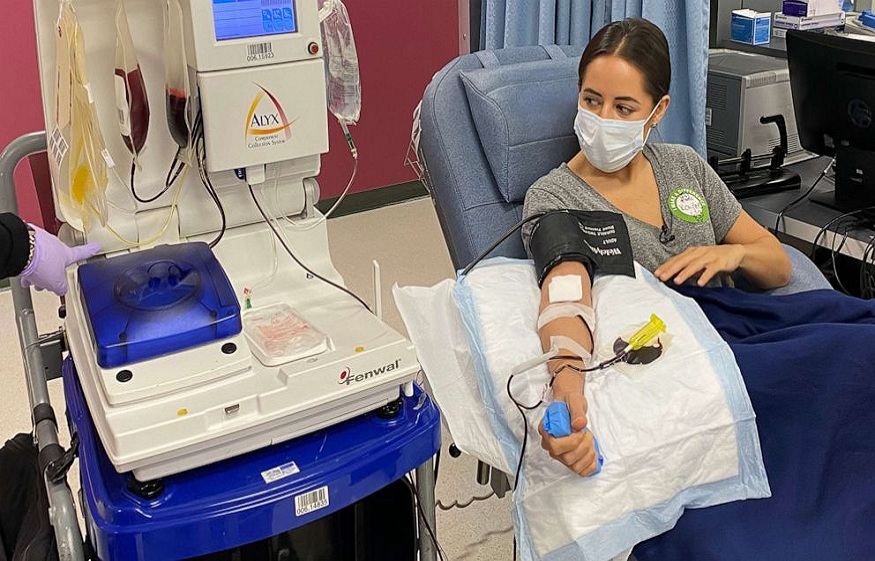The Lifesaving Power Of Donating Blood Plasma: How You Can Make A Difference

Key Takeaways:
- Blood plasma donation is crucial for saving lives and providing vital components for medical treatments.
- Plasma contains antibodies and clotting factors that are used in various therapies for immune deficiencies and bleeding disorders.
- Donating blood plasma can make a significant difference in the lives of patients worldwide.
- To be eligible for plasma donation, you must be in good overall health, meet age and weight requirements, and disclose relevant medical information.
- Preparing for plasma donation includes staying hydrated, eating a nutritious meal, getting plenty of rest, and avoiding caffeine and alcohol.
- The donation process involves a screening process, physical examination, and plasma separation using an apheresis machine.
- Benefits of donating plasma include health benefits, supporting the community, and receiving perks and incentives from donation centers.
- To get started, find a reputable plasma donation center, undergo the screening process, and schedule regular donation appointments.
1. Understanding the Lifesaving Potential of Blood Plasma Donation
When it comes to saving lives, blood plasma donation plays a crucial role. Plasma, the liquid part of our blood, is rich in vital components such as antibodies, proteins, and clotting factors. These components are used in various medical treatments and therapies, making blood plasma donation an essential and lifesaving practice.
The Science Behind Blood Plasma
Blood plasma is a pale yellow fluid that constitutes around 55% of the total blood volume. It carries nutrients, hormones, and proteins throughout the body, playing a crucial role in maintaining overall health and wellbeing. Plasma also contains specialized proteins like albumin, immunoglobulins, and clotting factors that are essential for various bodily functions.
Immunoglobulins, or antibodies, are proteins that help our immune system fight against infections and diseases. Clotting factors, on the other hand, are responsible for stopping bleeding by forming blood clots. These proteins are invaluable in treating individuals with immune deficiencies, bleeding disorders, and other medical conditions.
The Incredible Impact of Blood Plasma on Medical Treatments
Blood plasma is used in a wide range of therapies and treatments that have a significant impact on the lives of patients. One of the most important uses of plasma is in treating individuals with immune deficiencies, such as primary immunodeficiency disorders and autoimmune diseases.
Individuals with these conditions have compromised immune systems, making it difficult for their bodies to fight infections. The infusion of plasma containing immunoglobulins provides them with the antibodies they need to stay healthy and combat illnesses effectively.
Blood plasma also plays a vital role in treating patients with bleeding disorders such as hemophilia. These disorders are characterized by a deficiency or dysfunction of clotting factors, leading to excessive bleeding. By providing clotting factors through plasma transfusions, patients can prevent or control bleeding episodes, significantly improving their quality of life.
How Plasma Donation Saves Lives
By donating blood plasma, you have the power to save lives and make a difference in the lives of numerous individuals. Plasma collected from donors is processed and used to produce a wide range of plasma-derived medications and therapies. These life-saving products are administered to patients worldwide, helping them fight diseases, manage chronic conditions, and improve their overall well-being.
The demand for plasma and plasma-derived therapies is constantly increasing, and without regular donations, the supply would fall short of meeting the needs of patients in need. Your plasma donation could mean the difference between life and death for someone battling a life-threatening condition.
2. Eligibility and Preparation for Blood Plasma Donation
Before you can donate blood plasma, it is essential to determine if you meet the eligibility criteria set by donation centers. The criteria may vary slightly from one center to another, but there are general guidelines that potential donors must meet.
Are You Eligible to Donate Blood Plasma?
To be eligible for blood plasma donation, you must be in good overall health and meet certain age and weight requirements. The minimum age to donate plasma is usually 18 years, although some centers may allow 16 or 17-year-olds with parental consent. Additionally, you should weigh at least 110 pounds to ensure your safety during the donation process.
Medical conditions such as infections, cancer, heart disease, and certain chronic conditions may disqualify you from plasma donation. Certain medications and recent vaccinations may also affect your eligibility, so it’s important to disclose your medical history and any medications you are taking during the screening process.
Tips for Preparing for a Successful Donation
Preparing for a blood plasma donation can significantly enhance the success and comfort of the process. Here are a few tips to help you prepare:
- Stay well-hydrated: Drink plenty of fluids in the 24 hours leading up to your donation to ensure that your veins are plump and easily accessible.
- Eat a nutritious meal: Make sure to have a balanced meal before your donation to maintain your energy levels. Include foods rich in iron, such as leafy greens, lean meats, and beans, to optimize your hemoglobin levels.
- Get plenty of rest: Adequate sleep and rest before your donation will help you feel more relaxed and comfortable throughout the process.
- Avoid caffeine and alcohol: Opting for caffeine-free beverages and avoiding alcohol for at least 24 hours before donation can prevent dehydration and ensure the accuracy of your screening tests.
Ensuring a Safe and Comfortable Donation Process
When you arrive at the plasma donation center, you will undergo a screening process to ensure your eligibility and safety as a donor. This process typically includes a brief medical questionnaire and a review of your medical history. You will also undergo a physical examination, including measuring your vital signs and checking your hematocrit levels.
Once you are deemed eligible, trained healthcare professionals will guide you through the plasma donation process. They will explain the procedure, answer any questions you may have, and ensure that you are comfortable throughout the donation. During the procedure, a small portion of your blood is drawn, and the plasma is separated and collected using an apheresis machine. The remaining blood components are returned to your body, minimizing any potential side effects.
After the donation, it is crucial to take care of your body by staying hydrated, eating a nutritious meal, and avoiding strenuous physical activity for a few hours. These simple steps will help your body replenish the donated plasma and recover quickly.
3. The Benefits and Rewards of Donating Blood Plasma
Donating blood plasma not only saves lives but also offers several benefits and rewards for donors. Here are some of the ways that donating plasma can positively impact your health, community, and personal life.
The Positive Effects on Personal Health
Blood plasma donation offers various health benefits for donors. Regular plasma donation stimulates the body to produce new plasma cells, promoting overall blood cell renewal. This process can help maintain healthy blood flow, reduce the risk of cardiovascular diseases, and improve overall blood quality.
Furthermore, plasma donation allows you to undergo regular health check-ups as part of the screening process. These check-ups can lead to the early detection of certain health conditions, ensuring timely intervention and treatment.
How Plasma Donation Can Make a Difference in Your Community
By donating plasma, you directly contribute to the health and well-being of your community. Plasma-derived therapies are used in the treatment of various medical conditions, including immune deficiencies, hemophilia, burns, and trauma. By providing a critical resource for these therapies, you play a crucial role in improving the lives of individuals in your community who rely on plasma-based treatments.
Your plasma donation not only helps those in immediate need but also supports ongoing research and development in the field of medical therapeutics. Scientists and researchers use donated plasma to study new treatment options, develop innovative therapies, and advance medical knowledge.
The Perks and Incentives for Plasma Donors
In addition to the satisfaction of saving lives, many plasma donation centers offer incentives and rewards for donors. These perks can include compensation for your time and effort, loyalty programs that allow you to earn points for each donation, and special promotions or bonuses for frequent donors.
Some centers also provide free health screenings and access to wellness programs, ensuring that donors receive regular health check-ups and maintain their overall well-being. Additionally, the sense of community among donors and the opportunity to meet other like-minded individuals create a supportive and rewarding experience.
4. Steps to Take: How to Get Started with Blood Plasma Donation
Finding a Reputable Plasma Donation Center
To begin your journey as a blood plasma donor, the first step is to find a reputable plasma donation center near you. Research various centers in your area and consider factors such as their reputation, accreditation, and adherence to safety standards. Reading reviews and seeking recommendations from other donors can also provide valuable insights.
The Screening Process: What to Expect
Once you have chosen a donation center, you will need to undergo a screening process to ensure your eligibility as a donor. This process involves a confidential medical questionnaire where you will answer questions about your health history, lifestyle choices, and medications you may be taking.
The screening process may also include a physical examination, checking your vital signs such as blood pressure, pulse, and temperature. A small blood sample may be taken to determine your hematocrit levels and ensure that you have adequate iron stores.
Booking Appointments and Organizing a Regular Donation Schedule
Once you have successfully completed the screening process and been deemed eligible, you can begin booking appointments for your plasma donations. Many donation centers allow you to schedule appointments online or through a mobile app for convenience.
Consider organizing a regular donation schedule that fits your lifestyle and commitments. Regular plasma donation not only increases the impact of your contribution but also helps you develop a routine and ensures a steady supply of plasma for patients in need.
Donating blood plasma is a selfless act that has the power to save lives and make a lasting impact on individuals and communities. By understanding the lifesaving potential of plasma donation, preparing for the process, and embracing the benefits and rewards, you can play a vital role in improving the lives of others. Take the first step today and become a blood plasma donor – you have the power to make a difference!
FAQ
Question: What is blood plasma donation?
Answer: Blood plasma donation is the process of donating the liquid part of our blood, which contains vital components such as antibodies, proteins, and clotting factors, that are used in various medical treatments and therapies.
Question: How does blood plasma donation save lives?
Answer: Blood plasma collected from donors is processed and used to produce life-saving medications and therapies that are administered to patients worldwide, helping them fight diseases, manage chronic conditions, and improve their overall well-being.
Question: Who is eligible to donate blood plasma?
Answer: To be eligible for blood plasma donation, you must be in good overall health, meet certain age and weight requirements, and disclose relevant medical information. The minimum age for donation is usually 18 years old.
Question: How can I prepare for a successful blood plasma donation?
Answer: To prepare for a successful blood plasma donation, it is recommended to stay well-hydrated, eat a nutritious meal, get plenty of rest, and avoid caffeine and alcohol in the 24 hours leading up to the donation.
Question: What is the donation process for blood plasma?
Answer: The donation process for blood plasma involves a screening process, physical examination, and plasma separation using an apheresis machine. A small portion of your blood is drawn, and the plasma is separated and collected, while the remaining blood components are returned to your body.
Question: What are the benefits of donating blood plasma?
Answer: Donating blood plasma offers health benefits such as promoting overall blood cell renewal, reducing the risk of cardiovascular diseases, and facilitating regular health check-ups. It also benefits your community by providing essential resources for plasma-derived therapies and supporting ongoing research and development in the field of medical therapeutics.
Question: Are there any rewards for donating blood plasma?
Answer: Many plasma donation centers offer incentives and rewards for donors, such as compensation for time and effort, loyalty programs, special promotions or bonuses for frequent donors, free health screenings, access to wellness programs, and a sense of community among donors.
Question: How can I get started with blood plasma donation?
Answer: To get started with blood plasma donation, you can find a reputable plasma donation center near you, undergo the screening process to determine your eligibility, and then book appointments for regular plasma donations that fit your lifestyle and commitments.







